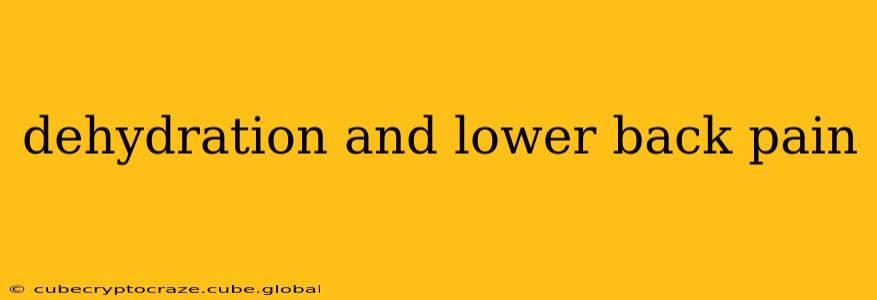Lower back pain is a common ailment, affecting millions worldwide. While many factors contribute to this discomfort, one often overlooked culprit is dehydration. This article explores the surprising link between dehydration and lower back pain, providing insights into the mechanisms involved and offering practical advice for prevention and relief.
How Does Dehydration Cause Lower Back Pain?
Dehydration doesn't directly cause lower back pain in the way, say, a slipped disc might. Instead, it creates a cascade of events that can significantly exacerbate existing back problems or trigger new ones. Here's how:
-
Intervertebral Disc Hydration: Our intervertebral discs, the cushions between our vertebrae, are largely composed of water. When dehydrated, these discs lose their cushioning effect, becoming less resilient and more susceptible to injury. This decreased hydration leads to increased pressure on the spine, potentially causing pain.
-
Muscle Spasms: Dehydration can also lead to muscle cramps and spasms, particularly in the back. Muscles rely on proper hydration to function optimally; dehydration weakens them, making them more prone to strain and spasm, which directly contributes to lower back pain.
-
Increased Spinal Stress: When dehydrated, the body attempts to conserve water by reducing blood flow to non-essential areas. This can impact the muscles supporting the spine, causing stiffness and pain. The reduced blood flow also hinders the delivery of nutrients and oxygen to the spinal tissues, potentially delaying healing and increasing discomfort.
-
Nerve Irritation: Dehydration can impact the way the nervous system functions. This can indirectly lead to increased sensitivity and pain perception in the lower back area. The body's overall hydration status can influence the responsiveness of nerve tissues.
Can Dehydration Worsen Existing Back Problems?
Yes, absolutely. If you already suffer from lower back pain due to conditions like arthritis, spinal stenosis, or a herniated disc, dehydration can significantly worsen your symptoms. The reduced cushioning and increased muscle tension associated with dehydration will place additional stress on your already compromised back, leading to increased pain and limited mobility.
How Much Water Should I Drink to Prevent Back Pain?
There's no magic number, as individual hydration needs vary based on factors like activity level, climate, and overall health. However, a good rule of thumb is to aim for at least eight glasses of water per day. Listen to your body – if you feel thirsty, you're already dehydrated. Pay attention to the color of your urine; light yellow is a good indicator of adequate hydration, while dark yellow suggests dehydration.
What Other Factors Contribute to Lower Back Pain?
While dehydration plays a role, it's crucial to remember it's rarely the sole cause of lower back pain. Other common contributing factors include:
- Poor Posture: Slouching or maintaining improper posture puts undue strain on the back.
- Lack of Exercise: Weakness in core muscles makes the back more vulnerable to injury.
- Obesity: Excess weight increases the stress on the spine.
- Stress: Stress can tense muscles, leading to pain.
- Underlying Medical Conditions: Conditions like arthritis, spinal stenosis, and sciatica can all cause lower back pain.
How Can I Tell If My Lower Back Pain Is Related to Dehydration?
It's difficult to definitively say lower back pain is only due to dehydration without a proper medical evaluation. However, if you experience back pain along with other symptoms of dehydration, such as fatigue, dizziness, headaches, or dark urine, dehydration may be a contributing factor. It's always best to consult a doctor or physical therapist to rule out other potential causes.
When Should I See a Doctor About Lower Back Pain?
Seek medical attention if your lower back pain:
- Is severe or doesn't improve with rest and over-the-counter pain relievers.
- Is accompanied by fever, weakness, numbness, or bowel/bladder dysfunction.
- Radiates down your leg(s).
- Is accompanied by unexplained weight loss.
By addressing dehydration and adopting healthy lifestyle choices, you can significantly reduce your risk of lower back pain and improve your overall well-being. Remember, staying well-hydrated is a cornerstone of good health and can contribute to a happier, pain-free back.
